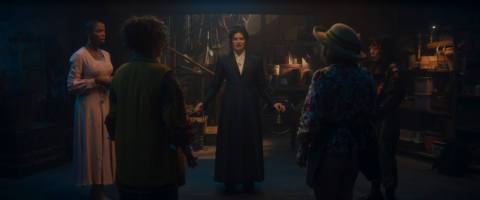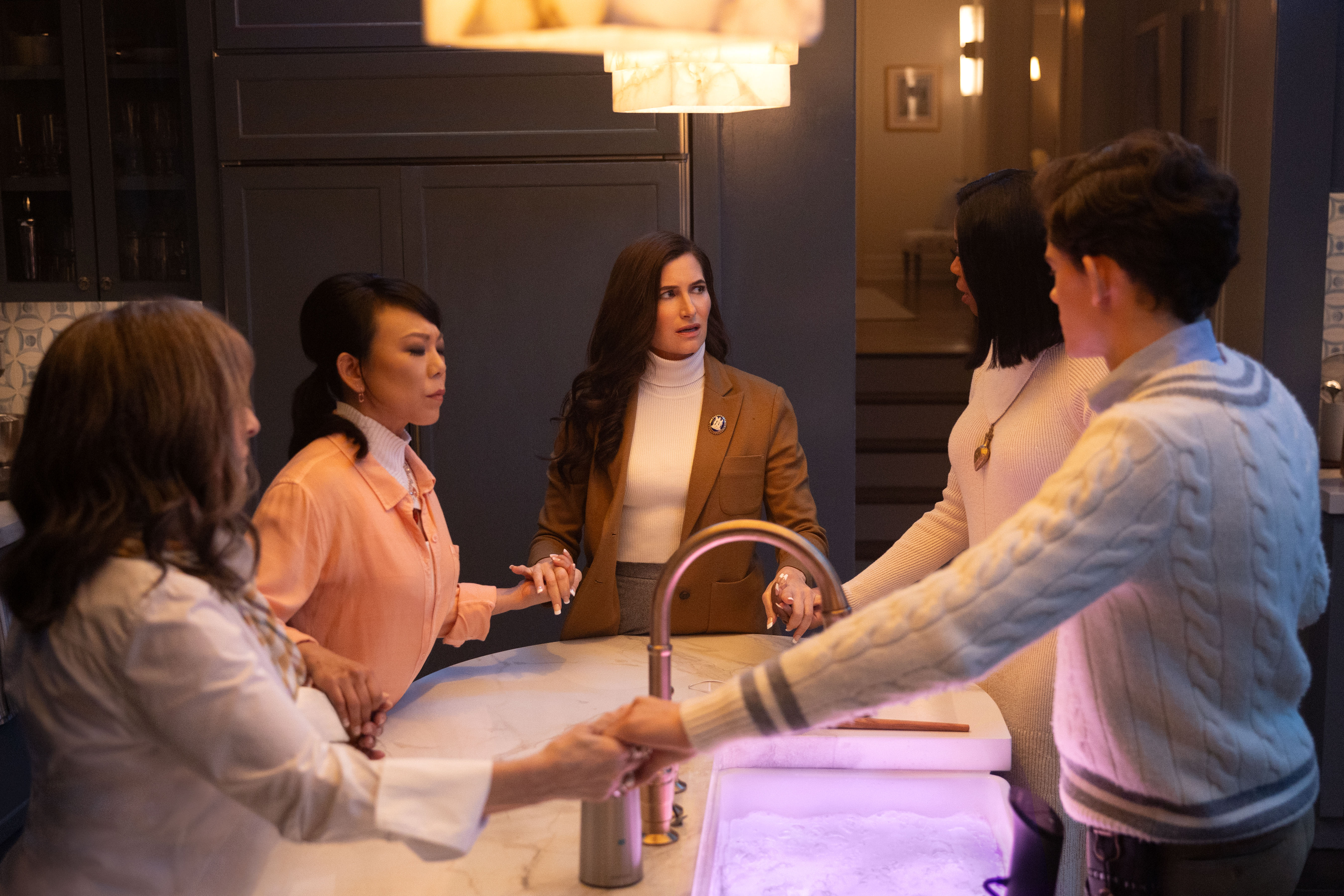
Even before Disney Plus premiered its Marvel Cinematic Universe show Agatha All Along, it was obvious that Disney tailored episode 2’s climactic song, “The Ballad of the Witches’ Road,” to be a huge viral hit. Showrunner Jac Schaeffer went to some of Disney’s current heaviest-hitter songwriters, Frozen composers Kristen Anderson-Lopez and Robert Lopez, to create the song — a follow-up to their viral breakout hit “Agatha All Along” from WandaVision, which gave the new series its title. Disney previewed the show with a live performance of the song at D23. The company dropped the first two episodes at the same time, so new viewers could get to the song’s introduction at the end of the second episode right away. And right after that premiere, Disney was ready to go with a behind-the-scenes featurette about its creation, and multiple official cuts of the song: the “True Crime Version” and the “Sacred Chant Version.”
But it’s also clear at this point that the song isn’t just a marketing tool — it’s a skeleton key that’s meant to unlock the series for viewers. For anyone watching the lyrics closely, it was clear that the big change at the end of episode 3 was coming sooner or later. “Ballad of the Witches’ Road” wasn’t just warning us what was coming, either: It’s likely telling us what comes next.
[Ed. note: Spoilers ahead for episode 3 of Agatha All Along.]
“Ballad of the Witches’ Road” lays out the whole process Agatha Harkness (Kathryn Hahn) and her cynically slapdash, thrown-together coven use to open the door to the Witches’ Road: They gather witches aspected toward fire, water, earth, and air, and use a “circle sewn with fate” — the witches suggested to Lilia Calderu (Patti LuPone) by an as-yet-unrevealed force — to “unlock the hidden gate.” And then they head underground, per the “down, down, down” chorus — a polysemy that can be simultaneously read as “descend into the abyss” and “proceed along the path.”
The warning for episode 3 comes in the line “If one bе gone, we carry on.” That line expressly tells the seekers what to do if one of their number dies on the Road — and it let viewers know in advance that death is a real possibility on this journey. The rest of that line, “spirit as our guide,” suggests that poor Mrs. Hart (Debra Jo Rupp) is coming back in a new form after her ignominious death at the end of the episode, and that she’ll be crucial in assisting the rest of the witches on their journey.
Once you start looking at the song’s lyrics as a roadmap to the series, they start to feel like foreshadowing. (Or spoilers, if you roll that way.) It isn’t that we needed the song to know someone might die on the journey — Lilia and her fellow witches make that clear enough with their horror and disbelief when they learn Agatha intends to try to walk the Road. It’s more that given how central Disney has made the song to the marketing and framing of the series, having it feature express instructions about how characters should handle specific developments, and what will follow, starts to seem like hanging Chekhov’s guns all over the walls.
So what else can we expect, according to the ballad? We’ve already seen a payoff for “I stray not from the path,” given what happened when Mrs. Hart did. “I hold death’s hand in mine” seems less straightforward and literal, though: It could mean anything from physical contact with Mrs. Hart’s ghost to simply another reminder that the Road is dangerous. Possibly it has more to do with the episode 3 hallucinations each member of the coven has, seemingly connected with people from their pasts who may be dead.

Debra Jo Rupp’s return as a “spirit guide” seems like an obvious step, given how little time Mrs. Hart got to reveal or explore anything about her character. In particular, she didn’t even seem to know she was a witch, or have any idea what a witch was, and yet she seemed to qualify as a witch for the purposes of the ballad ritual. It’d seem strange to drop such a potent difference between her and the other characters, then never entirely address it.
“Many miles of tricks and trials” seems obvious enough as well, in a broad sense — it suggests that the protagonists will spend most of the season navigating the ins and outs of the Road, along with navigating their various issues with each other, their histories, and their own magic, leading up to the “glory shall be thine” ending where the survivors get the power they want.
The first line that throws me is “Familiar by thy side,” given that none of the witch characters appear to have a familiar except Agatha, and she appears to have left Señor Scratchy behind when she and her group went down the stairs to the Road. Just to further seal the ballad’s importance to the show, season 1’s episode titles are lyrics from the song, so we’re possibly due for an episode called “Familiar By Thy Side” at one point. Maybe that’s where the witches acquire their own pets, or we learn that they all already have familiars and can summon them at will. Given that the MCU has essentially said nothing about what familiars are or what they can do (in part due to a crucial scene about Señor Scratchy getting cut from the WandaVision finale), anything could happen with this one.
But the payoff I’m most interested in is the one where we find out what “all that’s wrong is right and all that’s bad is good” means. The MCU has never previously suggested that all witch magic is inherently malign and malevolent, so I expect that line to refer to some event that reveals a little more about what it means to be a witch in this setting. Maybe there’s a test the characters have to pass by treating fair as foul and foul as fair, a line from the witches in Shakespeare’s Macbeth that gets an express reference in the song’s opening line. It’s hard to believe those lines mean anything as simple as “witchcraft is evil and all witches are monsters” — not in a setting as friendly to monsters as the MCU is.
Whatever it means, though, it’s clear enough that Schaeffer means for viewers to be watching the song (and the episode titles) for clues about what’s going on. Agatha and the coven have already started citing the song lyrics as rules and guides, and I suspect that before long, they’ll be having these same thoughts, trying to unpack and interpret the lyrics to figure out what’s coming next. They’re likely to start speculating about the song as early as episode 4, as they decide what to do about Sharon. We might as well join them.
